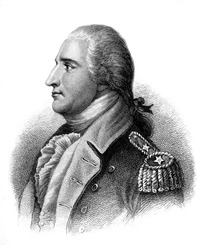Major General Benedict Arnold had served his country well, even taking a wound to his leg, but he felt the young America had not returned the kindness. Arnold had been repeatedly passed over for promotion and robbed of commands that were given to men of much lesser quality. In 1778, he had been accused of profiteering in Philadelphia, but the later court martial proved him innocent of all but a few minor charges. Despite his innocence, his name was blackened, and he wrote Washington, “Having become a cripple in the service of my country, I little expected to meet ungrateful returns.” The final straw came after his Quebec campaign, a military disaster, in which his retreat had run up severe costs. The Continental Congress was to reimburse him, but due to lack of proper documentation, Arnold was told he owed over £1,000.
Arnold was newly married to Peggy, the daughter of Philadelphia Loyalist Judge Edward Shippen. His Loyalist ideals were piqued, and, over the course of the next year, Arnold would begin a plan to change sides in the war. Communications exchanged between himself and various British officials until he made his demands of £20,000, coverage for his losses, and the rank of a brigadier general. In exchange, he gave troop positions, army strengths, and supply information to Clinton in his Hudson Valley campaign. In a final offer, Arnold promised to turn over the Continental fort at West Point, New York.
On September 21, Arnold met with British spy Major John André, but the forces under American Colonel John Jameson had attacked the HMS Vulture, chasing away André's escape. The major would have to return overland through enemy lines, and Arnold supplied him with the appropriate papers for safe passage. André did not go far before he was caught by Patriots, who took him to Jameson after finding suspicious notes in his socks. These papers were sent to Washington, and André asked Jameson to send him back to Arnold. Major Benjamin Tallmadge, a member of Washington's intelligence service, convinced the colonel to hold onto the spy, and, though Jameson was highly suspicious of the divergence from the chain of command, not to mention the capture to the suspect Arnold.
That Sunday morning, Benedict Arnold, blissfully ignorant of André's capture, met with Washington for breakfast. The commander-in-chief had read the indicting papers, but he remained calm. Fellow military leaders said that the breakfast was pleasant and full of conversation about plans for winter. As he stood, Washington said to the soldiers, “Men, do the Major General the honor of arrest on suspicion of treason.” Arnold reportedly tried to fight his way from the room, but the Patriots, including Washington, subdued him. Just before he was dragged away, Arnold made a last request to Washington to allow his wife Peggy safe passage back to her family in Philadelphia. Washington would fulfill the request.
The investigation would take up the next week. Being found completely guilty, Benedict Arnold would be hanged alongside André on October 2. Just after his death, a letter from Arnold entitled “To the Inhabitants of America” would be published in Loyalist newspapers throughout the former colonies. In it, Arnold redressed his grievances: the independence of the Articles of Confederation despite offers to meet pre-war demands and return to the British Empire, a rejection of treaty with the French (whom he described as “the enemy of the Protestant faith”), and the lack of rebels to follow simple “common sense”, as had been recommended by Thomas Payne's pamphlet.
With a popular martyr, the Loyalist movement in the Colonies would begin anew. Washington would spend years settling uprisings and defeating British troops as they moved. The Crown, meanwhile, began a scheme of amphibious attacks that were intended to wear down the rebels but only dragged on an expensive war, inciting riots of war-weary cities. Internationally, the Dutch, Spanish, and French preyed heavily on the British shipping and conquered other colonies. Finally, in 1785 after the bloody defeat of British General Cornwallis at the Battle of Williamsburg, the Revolutionary War would end. International fighting would continue until the humiliating Treaty of Paris of 1788 was signed.
In the wake of the successful, though hard-fought, revolution in America, emulated revolutions would break out in France and over the Continent. What papers called “democratic chaos” caused uproars and wars against the French Republic until finally the kings of Europe agreed that they had gone too far in giving the Americans republican rule. The American Invasion would begin in 1815 and force upon them as king Prince Edward, George III's fourth son. In the coming years, his daughter Victoria would become queen of both America and England, finally reuniting the wayward colonies, though with separate parliaments.
–
In reality, Arnold received word about the capture of Major André, and he would quickly flee to the British fleet. There he would be granted his rank and serve in violent attacks in Connecticut and Virginia. After the war, Arnold would go to London, where he would try his hand at mercantilism before retiring to his death in 1801.

No comments:
Post a Comment